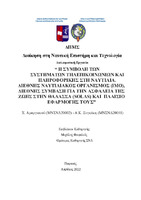Η συμβολή των συστημάτων τηλεπικοινωνιών και πληροφορικής στη ναυτιλία. Διεθνής Ναυτιλιακός Οργανισμός (ΙΜΟ), Διεθνής Σύμβαση για την Ασφάλεια της Ζωής στην Θάλασσα (SOLAS) και πλαίσιο εφαρμογής τους
The contribution of telecommunications and information systems in maritime industry. International Maritime Organization (IMO), International Convention of Safety of Life at Sea (SOLAS) and implementation framework of above systems

Master Thesis
Author
Αμαργιανού, Χριστίνα
Ξυγκάκη, Άννα Καρολίνα
Date
2022-04Advisor
Φαφαλιός, ΜιχαήλView/
Keywords
Νέες τεχνολογίες ; Συστήματα τηλεπικοινωνιών ; Ηλεκτρονική ναυτιλία ; Συστήματα πληροφορικήςAbstract
This dissertation attempts to present how the integration of New Technologies in Shipping has radically changed the modus operandi of human resources and all functions of the industry and in particular how Information Systems in shipping and technology in telecommunications contribute multidimensionally to the optimization of the industry.
The first chapter presents the aim of the work which is to emphasize the existing interdependence between Telecommunications and Information Systems in the Shipping Industry. In the second chapter, we review the concepts of the System, the Communication and Information Systems, and in the third chapter we aim to present the way in which the industry harmonizes with the new reality through the regulations imposed by International Conventions and Organizations, but also how they are adopted in our country, displaying also the last decade amendments.
The fourth chapter deals with Telecommunications and specifically, refers to the most essential systems used in shipping and based on satellite technology. The fifth chapter focuses on Information Systems, emphasizes their necessity, their types, and analyzes the ERP system used in shipping companies.
In our digital age, maritime industry can be considered as "E- Maritime". The sixth chapter studies the dimensions of above concept and the radical changes in ports’ features, so that they can indeed be described as "smart ports" and integrate them fairly into the Logistics industry.
Finally, through the emerging trends and presented conclusions, the purpose of this work is to inform about the application of technological advances in the field of Shipping, and how they contribute to safe navigation and modern competitive environment.


